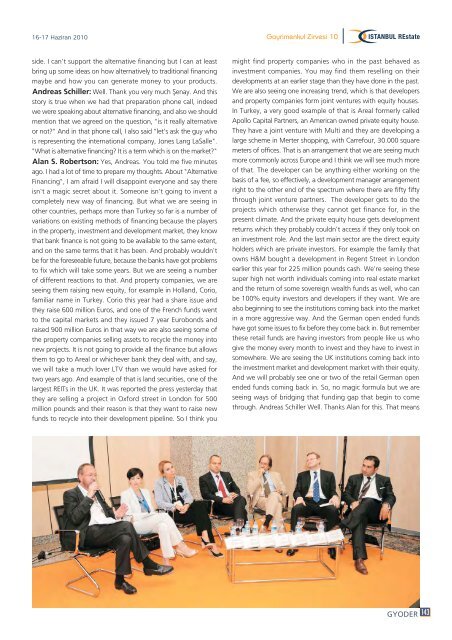Zirve Eki - ISTANBUL REstate
Zirve Eki - ISTANBUL REstate
Zirve Eki - ISTANBUL REstate
You also want an ePaper? Increase the reach of your titles
YUMPU automatically turns print PDFs into web optimized ePapers that Google loves.
16-17 Haziran 2010<br />
side. I can't support the alternative financing but I can at least<br />
bring up some ideas on how alternatively to traditional financing<br />
maybe and how you can generate money to your products.<br />
Andreas Schiller: Well. Thank you very much fienay. And this<br />
story is true when we had that preparation phone call, indeed<br />
we were speaking about alternative financing, and also we should<br />
mention that we agreed on the question, "is it really alternative<br />
or not?" And in that phone call, I also said "let's ask the guy who<br />
is representing the international company, Jones Lang LaSalle".<br />
"What is alternative financing? It is a term which is on the market?"<br />
Alan S. Robertson: Yes, Andreas. You told me five minutes<br />
ago. I had a lot of time to prepare my thoughts. About "Alternative<br />
Financing", I am afraid I will disappoint everyone and say there<br />
isn't a magic secret about it. Someone isn't going to invent a<br />
completely new way of financing. But what we are seeing in<br />
other countries, perhaps more than Turkey so far is a number of<br />
variations on existing methods of financing because the players<br />
in the property, investment and development market, they know<br />
that bank finance is not going to be available to the same extent,<br />
and on the same terms that it has been. And probably wouldn't<br />
be for the foreseeable future, because the banks have got problems<br />
to fix which will take some years. But we are seeing a number<br />
of different reactions to that. And property companies, we are<br />
seeing them raising new equity, for example in Holland, Corio,<br />
familiar name in Turkey. Corio this year had a share issue and<br />
they raise 600 million Euros, and one of the French funds went<br />
to the capital markets and they issued 7 year Eurobonds and<br />
raised 900 million Euros in that way we are also seeing some of<br />
the property companies selling assets to recycle the money into<br />
new projects. It is not going to provide all the finance but allows<br />
them to go to Areal or whichever bank they deal with, and say,<br />
we will take a much lover LTV than we would have asked for<br />
two years ago. And example of that is land securities, one of the<br />
largest REITs in the UK. It was reported the press yesterday that<br />
they are selling a project in Oxford street in London for 500<br />
million pounds and their reason is that they want to raise new<br />
funds to recycle into their development pipeline. So I think you<br />
Gayrimenkul <strong>Zirve</strong>si 10<br />
might find property companies who in the past behaved as<br />
investment companies. You may find them reselling on their<br />
developments at an earlier stage than they have done in the past.<br />
We are also seeing one increasing trend, which is that developers<br />
and property companies form joint ventures with equity houses.<br />
In Turkey, a very good example of that is Areal formerly called<br />
Apollo Capital Partners, an American owned private equity house.<br />
They have a joint venture with Multi and they are developing a<br />
large scheme in Merter shopping, with Carrefour, 30.000 square<br />
meters of offices. That is an arrangement that we are seeing much<br />
more commonly across Europe and I think we will see much more<br />
of that. The developer can be anything either working on the<br />
basis of a fee, so effectively, a development manager arrangement<br />
right to the other end of the spectrum where there are fifty fifty<br />
through joint venture partners. The developer gets to do the<br />
projects which otherwise they cannot get finance for, in the<br />
present climate. And the private equity house gets development<br />
returns which they probably couldn't access if they only took on<br />
an investment role. And the last main sector are the direct equity<br />
holders which are private investors. For example the family that<br />
owns H&M bought a development in Regent Street in London<br />
earlier this year for 225 million pounds cash. We're seeing these<br />
super high net worth individuals coming into real estate market<br />
and the return of some sovereign wealth funds as well, who can<br />
be 100% equity investors and developers if they want. We are<br />
also beginning to see the institutions coming back into the market<br />
in a more aggressive way. And the German open ended funds<br />
have got some issues to fix before they come back in. But remember<br />
these retail funds are having investors from people like us who<br />
give the money every month to invest and they have to invest in<br />
somewhere. We are seeing the UK institutions coming back into<br />
the investment market and development market with their equity.<br />
And we will probably see one or two of the retail German open<br />
ended funds coming back in. So, no magic formula but we are<br />
seeing ways of bridging that funding gap that begin to come<br />
through. Andreas Schiller Well. Thanks Alan for this. That means<br />
143<br />
GYODER


